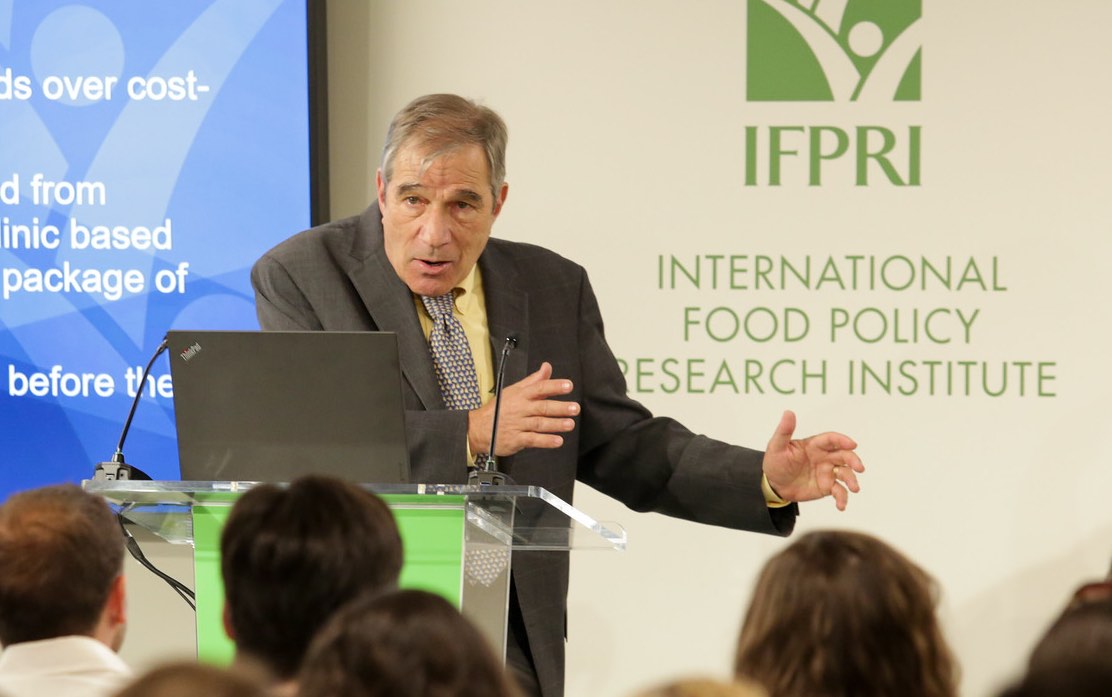Investing in young children’s nutrition yields substantial economic benefits to society. But that is only the beginning of understanding the connections between nutrition, health, and economic growth, according to IFPRI Senior Research Fellow Harold Alderman. Delivering the Martin J. Forman Memorial Lecture at IFPRI June 27, Alderman explored these pathways and ways to reform the targeting of nutrition investments, policies, and programs.
“Stature is not the outcome measure we want—we want IQ, we want neonatal survival!” Alderman said. “If we have success, we will affect stature, affect cognitive development and improve the life of the woman who often is just treated as a caregiver rather than an individual in herself.”
The annual lecture, now in its 29th year, celebrates Martin J. Forman’s contributions to global nutrition as former head of nutrition at the U.S. Agency for International Development (USAID), which includes establishing the United Nations Subcommittee on Nutrition. Forman’s son, Kenan, opened the lecture by thanking the selection committee and IFPRI for what he called “a great honor” for his family, who were all present—children and grandchildren—for the first time in many years.
Alderman’s impassioned lecture is particularly timely, IFPRI Director General Shenggen Fan said: “We’re [currently] worried about the lack of funding or unstable funding in international development, particularly in nutrition, and that investment in nutrition is critical as the multiple burden of malnutrition persists.”
Titled “Two Dimensions of Growth: Biology and Economics,” the lecture addressed the broad benefits of investing in nutrition, beyond specific goals such as reducing stunting. Nutrition programs often focus on stunting, he said, but “stunting is not stature and stature is not nutrition.” He lamented this tendency, which he attributed to a narrow focus on meeting the UN Sustainable Development Goals (SDGs).
Instead, Alderman said, nutrition and early childhood interventions should be integrated into a life-cycle approach to personal and economic development.
“Anywhere skills are important, nutrition gives you high returns,” said Alderman, noting the declining role that physical strength plays as an economic driver.
Reducing infant mortality, meanwhile, should not be viewed only as an economic return, he said: “There is a human rights value to try to save an infant’s life.” Such blunt economic calculations, for instance, weigh the value of a life on potential lifetime earnings—assigning less value to, say, the life of an African vs. that of a European.
Focusing interventions on the first year makes sense, Alderman said, noting that 40% of all child mortalities occur in the first 3 weeks of life and an additional 30% prior to a child’s first birthday. But that’s not sufficient, and even the current focus on the 1,000 days from pregnancy to the second birthday should be expanded to 1,200 days, he recommended, with a pivot toward cognitive development in the latter half, as “cognition is the core of the rates of return from nutrition.” He cited a case study in Jamaica in which children who were stunted received cognitive intervention and successfully closed the cognitive gap over time.
“No matter what we do, no matter any of our optimistic dreams re SDGs, there will be some malnourished children, we will fail some cases. If we are failing those cases, let’s find a way to have them catch up in their cognitive skills so they can still have the skills to enter the labor market and contribute to economic development,” he concluded.
The lecture was followed by a robust discussion with in-room and online audiences and Anne M. Peniston, deputy director of the USAID Office of Maternal and Child Health and Nutrition, wrapped up the event by highlighting another of Forman’s legacies, the USAID Martin J. Forman Foreign Service National Fellowship. The program—whose current cohort includes fellows from Kenya, Ghana, Nepal, Guatemala, and Sudan—was established in 2014 to expose participants to research at the global level and inject on-the-ground experience into exchanges between field and headquarters, to more effectively shape research and policy agendas on nutrition.
Katarlah Taylor is an IFPRI Senior Events Specialist.







